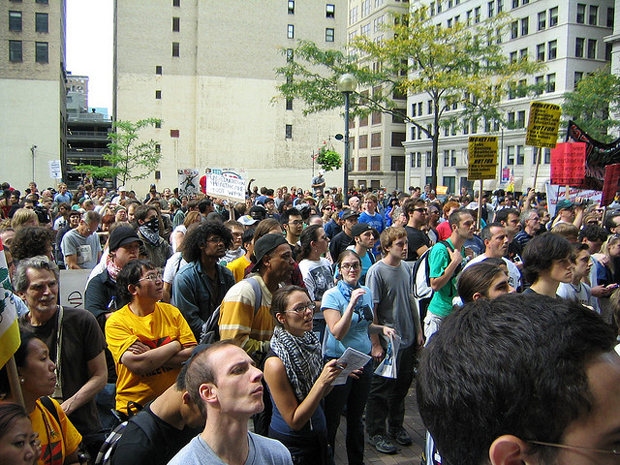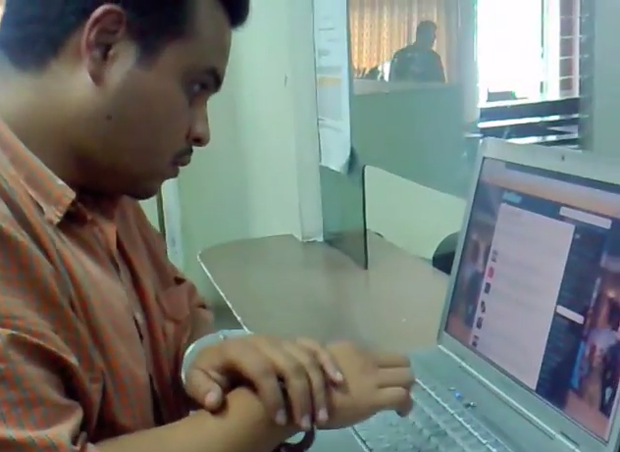28 Jan 2016 | Mapping Media Freedom, News, Russia
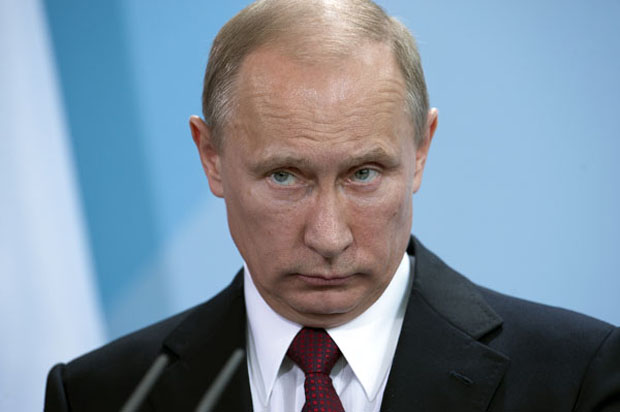
(Image: /Demotix)
Russia’s media freedom has declined under the government of Vladimir Putin. The president and his allies have used a cloak of legislative legitimacy to target potential opposition to his rule. Mapping Media Freedom correspondents Ekaterina Buchneva and Andrey Kalikh explore what this means for two important sectors of the Russian media.
Print and broadcast media
By Ekaterina Buchneva, Mapping Media Correspondent
Under Russia’s law on mass media amended in autumn 2014, foreign owners are restricted to 20% of shares in media organisations in the country. Its authors said that the legislation would halt the West’s “cold information war”. The law has triggered major changes in the Russian media market and, as critics warned when the law was passed, was used to replace international investors with locals loyal to the Kremlin.
The Russian edition of Forbes magazine, formerly owned by German media conglomerate Axel Springer and known for its independent editorial policy, was sold to businessman Alexey Fedotov, who immediately said that the publication was “too focused on politics” and should cover more business news. In January 2016, the magazine named Nikolay Uskov as its new editor-in-chief. Uslov, a former editor-in-chief of the Russian edition of GQ, has never worked in business journalism.
Finland’s Sonoma Independent Media, America’s Dow Jones and the UK’s Pearson also had to sell their shares in Vedomosti, the main business newspaper known for its critical opinion pieces. Now the paper’s new — and only — owner is Demian Kudryavtsev, a business partner of oligarch Boris Berezovsky, who died in 2013, and a former chief executive of major Russian publishing house Kommersant. Kudryavtsev also purchased The Moscow Times, the country’s only English-language daily. Some journalists were concerned about the origin of the money Kudryavtsev used in the deal and suggested that there was another buyer behind him.
The media ownership law also affected a number of glossy magazines, which, as one of the law’s author said, “squeeze articles favorable to the West and the fifth column in between news about cars and glamorous watches”, and entertainment television channels. CTC Media sold 75% of its shares to loyal to the Kremlin oligarch Alisher Usmanov, who also owns the Kommersant publishing house.
The Russian broadcasters of CNN, Cartoon Network and Boomerang, as well as 11 television channels of Discovery group, came under the control of Media Alliance, 80% of which belongs to National Media Group. The president of NMG, which also owns a number of Russian media organisations, including RenTV, Channel Five, Izvestia newspaper and 25% of Сhannel One, is Kirill Kovalchuk, a nephew of Putin’s old friend Yuri Kovalchuk.
Tightening control over foreign publishers
In addition, in December 2015, another bill with new amendments to the “law about mass media” was introduced into the Russian State Duma. It contains more limitations for media organisations, some of them refer to foreign publishers.
The bill suggests new legal background — violation of anti-extremism legislation — for denying or revoking distribution permit for foreign publishers. Among the ones that now have such permits are Frankfurter Allgemeine Zeitung, China Daily, European Weekly, GQ, Cosmopolitan, Esquire, Tatler, Vogue, and some papers from CIS (Commonwealth of Independent States) countries, including Expert.Ukraine magazine.
“The problem is vagueness and inconsistency of the anti-extremism legislation itself and the practice of its implementation by the Russian authorities,” says Damir Gainutdinov, lawyer of Inter-regional Association of Human Rights Organisations “Agora”.
“It is primarily about Article 1 of the Federal Law on Countering Extremist Activity, which gives a definition of extremism, extremist materials, etc. In practice, this definition is used not only for hate crimes but also, for example, criticism of the Russian authorities. Condemnation of the Crimea annexation is recognised as calls for infringement of the territorial integrity of Russia, as it was in the case of Rafis Kashapov (Tatar activist from Tatarstan, who was convinced in September 2015 to three years in jail for posting informational materials criticising Crimea annexation), and criticism of the United Russia is recognised as the incitement of hatred to a social group, as it was in the case of prohibition of video clips by Navalny (a few activists were found guilty of distribution of extremist materials for posting a video by opposition leader Alexey Navalny titled ‘Let’s recall manifest-2002 to crooks and thieves’, on social media). Therefore, any unenthusiastic article published by foreign media may be recognised as a violation of anti-extremist legislation. Another thing is that this applies only to the print media. Since February 2014, it works much easier with websites; they can be just blocked by orders of the general prosecutor office.”
According to the bill, the foreign publishers also will have to pay a fee for issuing a distribution permit. The authors explained that it would “eliminate the unfair advantage of the founders of foreign publications that provides them with more favorable business conditions”.
Another bill, that was already approved by the State Duma, requires Russian media organisations to inform Roskomnadzor (The Federal Service for Supervision in the Sphere of Telecom, Information Technologies and Mass Communications) about foreign funding, including funding from foreign states, international organisations and Russian NGOs that were considered “foreign agents”. The minimum amount of money that should be declared is 15,000 roubles (less than $200). Penalties for not notifying Roskomnadzor will be fines of 30-50,000 roubles (about $400-600) for officials and the amount of money received for companies. A repeated violation will be punished with a fine of 80,000 roubles (about $1,000) and triples amount of money received.
This bill resembles the one adopted in June 2012 by the Russian State Duma, requiring NGOs to register as “foreign agents”, says Damir Gainutdinov. “First, it is a simple registration and then more and more new burdens will be introduced, for example, state bodies will deny accreditation of such media organisations, officials will be banned from giving them interviews and answering their questions … An additional mandatory audit and special checks of staff could be introduced, who knows what else.”
The bill about foreign funding could affect a number of media platforms – from Colta.ru that cover art and culture to Mediazonа that highlights problems of the Russian justice and the penal system.
Limitations for founders of media organisations
Another block of amendments introduces a new restriction for media founders. It suggests that those, who have unspent or unexpunged convictions for crimes against the constitutional order, public security and public safety, can not found a media organisation.
Those crimes include a number of criminal articles – from hooliganism and repeated violation of rules of organising or holding rallies and demonstrations to espionage and treason. But the most tricky ones are incitement of hatred and abasement of human dignity (Article 282 of the Criminal Code of Russia), public calls for extremism (Article 280) and public calls for infringement of the territorial integrity of Russia (Article 280.1), says Damir Gainutdinov. “These articles are used for persecution of dissenters. In absolute numbers, there are not many cases like this against journalists, but such practice is developing gradually – Stomaknih, Yushkov, Kashapov”.
However, these limitations could not prevent dissenters from taking part in media management at different positions. For example, Pussy Riot members Nadezhda Tolokonnikova and Maria Alekhina, who were convinced for hooliganism, founded Mediazona platform, but as Tolokonnikova told RBC newspaper, they were not officially registered as founders as they had foreseen possible legal problems.
Internet
By Andrey Kalikh, Mapping Media Correspondent
Russia’s environment for freedom of expression on the internet has declined precipitously since 2002 when the law on Counteracting Extremism was adopted. The definition of extremism used in the law is vague and overly broad, according to Aleksandr Verkhovski, an expert on extremism from the SOVA Information and Analytical Centre in Moscow. Verkhovski said that the law was written to keep independent media, oppositional political parties, and “not official” religious confessions under control.
In 2012, the anti-extremism law was amended to empower Roskomnadzor, the state media and communication watchdog, to launch the United Register of Banned Websites. The modifications also enabled the agency to add websites that have “extremist content” without judicial approval. Once a site is added to the list, Russia’s internet services providers are obliged to block it. Within days of the changes, several independent media outlets and political opposition sites websites and blogs — Grani.ru, Ej.ru, Alexei Navalny’s blog — were blacklisted in the country.
On 30 December 2015 a district court in the Siberian city of Tomsk sentenced blogger Vadim Tyumentsev to five years in prison for two videos he posted on his YouTube page.
In the first video, the blogger criticised the local government’s decision to raise the cost of fares on the city’s public transport. In the second video, he said that authorities help refugees from eastern Ukraine more than they help local residents.
The court recognised both of Tyumentcev’s videos as “having extremist character”. Ekaterina Galyautdinova, the presiding judge, gave Tyumentsev a sentence even longer than the prosecutor had pursued. She also banned Tyumentsev from posting online for three years.
The Tyumentcev case is far from the first time that a blogger has been subjected to a prosecution. In 2007, Savva Terentyev, a blogger from the Siberian city of Syktyvkar, was sentenced to a large fine for “offending a social group” – in this case, the local police force – by writing about bad behaviour and human rights abuses committed by officers. In 2012, Maxim Efimov, a blogger from Petrozavodsk, Republic of Karelia, faced prosecution after he posted an article under the headline.
In 2012, Maxim Efimov, a blogger from Petrozavodsk, Republic of Karelia, faced prosecution after he posted an article under the headline “Karelia is tired of priests”, in which he criticised the leadership of the Russian Orthodox Church. Efimov left Russia and was subsequently granted political asylum in Estonia.
That same year the Prosecutor General Office blocked the website and blog of Alexei Navalny, blogger and opposition leader, for allegedly calling “for mass disorders”. Navalny was sentenced to the administrative detention for 15 days and faced other accusations related to his political activities.
“Bloggers law”
In August 2014, the Russian State Duma adopted a number of amendments to communication legislation. The so-called “bloggers law” required sites with more than 3,000 visitors a day to register with Roskomnadzor and observe the same rules as much larger media outlets.
Under the amendments, all site owners and social media users are required to disclose their names and email address on their websites. Owners and users must keep all the information published on the web including personal data for at least six months and immediately submit to the law enforcement bodies on demand.
Moreover, Roskomnadzor received the right to request personal information from all site owners and users.
Most recently, as of 1 January 2016, the “bloggers law” requires all websites and social media platforms to keep all personal data of Russian users on servers within Russian territory. Failing to do this means Roskomnadzor can block the site or service. Companies can either comply or cease doing business in Russia.
According to the Roskomnadzor spokesman Vladimir Ampelonski, some foreign companies submitted to the requirement and brought their servers to Russia. However, some companies — Google, Facebook and Apple — have defied implementing this change. Facebook representatives met with the authority’s deputy chief, Aleksandr Zharov. At the meeting the company said it will not observe the law because it is “economically disadvantageous”, the Vedomosti newspaper reported.
Empowering the FSB
After Putin’s re-election in 2012, Russian security service FSB’s powers were considerably expanded. Articles of the Criminal Code of the Russian Federation on high treason, espionage and disclosure of state secrets were widened and made ever more vague by introducing language on cooperation with any “foreign organisation, or their representatives in hostile activities to the detriment of the external security of the Russian Federation”.
The FSB has further tried to make investigative journalism more by lobbying members of the State Duma to pass a draft law limiting access to information on commercial real estate transactions. If passed, the law would make it impossible to uncover cases of illicit enrichment by government officials.
This article was originally published on Index on Censorship.
23 Jan 2015 | News
Bahrain
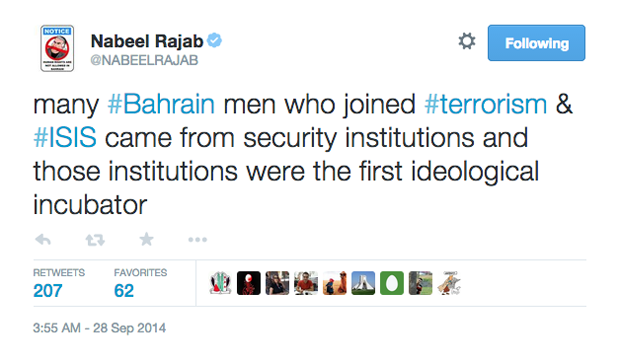
This week, prominent Bahraini human rights activist Nabeel Rajab was handed down a six month suspended sentence over a tweet in which both the country’s ministry of interior and ministry of defence allege that he “denigrated government institutions”. Rajab was only released last May after two years in prison, over charges that included sending offensive tweets. His experience is not unique in Bahrain. In May 2013, five men were arrested for “insulting the king” via Twitter.
Turkey
A former Miss Turkey was recently arrested for sharing a satirical poem criticising the country’s President Recep Tayyip Erdogan on her Instagram account. She is set to go on trial later this year. Turkey has a chequered relationship with social media, temporarily banning both Twitter and YouTube in the wake of the Gezi Park protests, in large part organised and reported through social media. In 2013, authorities arrested 25 individuals for spreading “untrue information” on social media.
Saudi Arabia
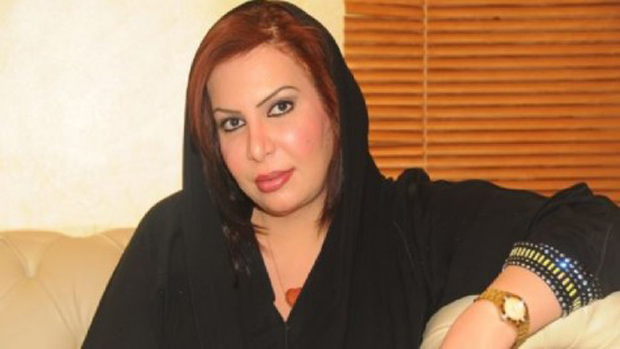
(Photo: Gulf Centre for Human Rights)
In late 2014, women’s rights activist Souad Al-Shammari was arrested during an interrogation over some of her tweets. The charges against her include “calling upon society to disobey by describing society as masculine” and “using sarcasm while mentioning religious texts and religious scholars”, according to the Gulf Centre for Human Rights.
France
![(Photo: « Source : Réseau Voltaire » [CC BY-SA 3.0 (http://creativecommons.org/licenses/by-sa/3.0)], via Wikimedia Commons](https://www.indexoncensorship.org/wp-content/uploads/2015/01/Dieudonné_Axis_for_Peace_2005-11-18.jpg)
(Photo: Réseau Voltaire [CC BY-SA 3.0], via Wikimedia Commons)
Following the series of terrorist attacks in Paris in early January, at least 54 people have been detained by police for “defending or glorifying terrorism”. A number of the cases, including against comedian Dieudonne M’bala M’bala, are believe to be connected to social media comments.
Britain

A 22 year old man was arrested in for “malicious communication” following Facebook messages made in response to the murder of soldier Lee Rigby, and another user was arrested after taunting Olympic diver Tom Daly about his dead father. More recently, police arrested a 19-year-old man over an “offensive” tweet about a bin lorry crash in Glasgow that killed six people. TV personality Katie Hopkins, known for her controversial tweets, was also reported to Scottish police following some tasteless tweets about about Scots. The incident prompted Scottish police the to post their now infamous tweet declaring they would continue to “monitor comments on social media“.
China
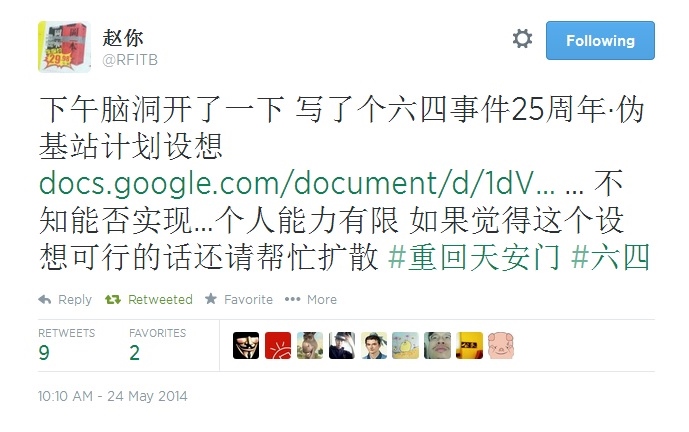
Online activist Cheng Jianping was arrested on her wedding day in 2010 for “disturbing social order” by retweeting a joke by her fiance. She was sentenced to one year of “re-education through labour”. Twitter is officially banned in China, and microblogging site Weibo is a popular alternative. In 2013, four Weibo users were arrested for spreading rumours about a deceased soldier labelled a hero and used in propaganda posters. The four were said to have “incited dissatisfaction with the government”, according to the BBC.
Australia
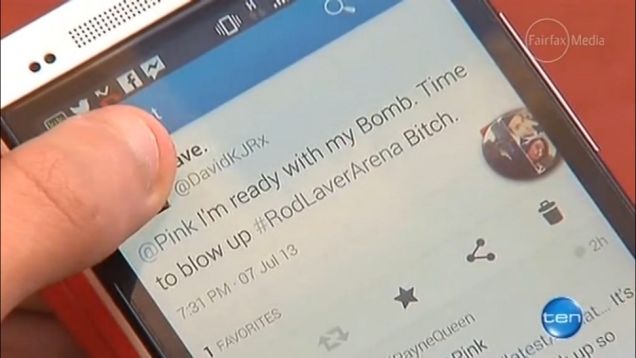
A teen was arrested prior to attending a Pink concert in Melbourne for tweeting: “I’m ready with my Bomb. Time to blow up #RodLaverArena. Bitch.” The tweet referenced lyrics from the American popstar’s song Timebomb.
India
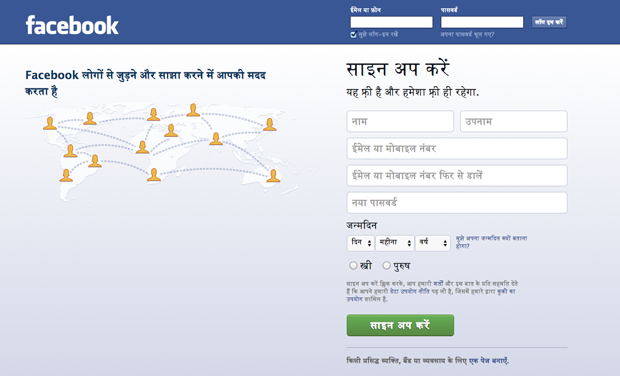
An Indian medical student was arrested in 2012 over a Facebook post questioning why her city of Mumbai should come to a standstill to mark the death of a prominent politician. Her friend was arrested for liking the post. Both were charged with engaging in speech that was offensive and hateful.
United States
Back in 2009, a New York man was arrested, had his home searched and was placed under £19,000 bail for tweeting police movements to help G20 protesters in Pittsburgh avoid the officers. According to Global Voices, it is unclear whether his actions were actually illegal at the time.
Guatemala
A man was arrested in 2009 for causing “financial panic” by tweeting that Guatemalans should fight corruption by withdrawing all their money from banks.
This article was posted on 23 January, 2015 at indexoncensorship.org
27 Nov 2014 | Americas, Digital Freedom, Europe and Central Asia, Ireland, News, United Kingdom, United States
How did people organise protests before the internet? How did riots happen? How did terrorists carry out attacks? All these things definitely happened. I remember them distinctly. In the days before the world wide web, all sorts of things occurred without anyone “taking to social media” or “using sophisticated communications technology” (phones).
But current discussions are premised on the idea that the web in itself has created civil disorder and even terrorism.
In Ireland, as protests have got to the point where government ministers can barely leave the house without being confronted by citizens unhappy with proposed household water metering, commentator Chris Johns suggested that “Social media has brought more illness to Ireland than Ebola has. Anarchists, extremists and all-round loonies can find a voice and organisational structure – if only for a decent riot – amidst a political fragmentation that rewards those who shout the loudest.”
Considering there have been no recorded incidents of Ebola in Ireland, the first part of this assertion could be technically true; or we could say that social media has brought the same amount of illness to Ireland — none. As for the anarchists and loonies, well, they have always been with us, and had some success in organising before Facebook came along.
Across the Atlantic, St. Louis County Prosecuting Attorney Robert McCulloch said that “nonstop rumours on social media” had significantly hampered the investigation into the killing of Michael Brown, and contributed to his decision not to prosecute. This in the land of the First Amendment, where the justice system long ago learned to deal with hearsay.
Back over the ocean again, the UK’s Intelligence and Security Committee report into the murder of Drummer Lee Rigby by Michael Adebolajo and Michael Adebowale pointed to a Facebook message sent by Adebowale, in which he expressed a desire to kill a soldier. In spite of several failures by the intelligence services, who were long aware of Adebowale’s tendencies, Facebook faced criticism for not “flagging up” the message to the security forces. Social media to blame once again.
Why do we do this? Why must every single occurrence now have a social media angle?
Partly because everything many of us do now does have an internet angle. The web is simply part of human interaction for millions.
But for some it seems foreign. My generation is the last that will remember life before the internet.
For all that, it is still shockingly new. I’m not just saying that to make myself feel younger. Some people my age and older (“digital immigrants”, apparently, which makes me a double immigrant) have adapted reasonably well to our new environment. Some really haven’t. I have watched a QC attempt to explain the difference between a reply and a direct message on Twitter. It was as you’d expect, equal parts cute and infuriating, but it did also make one think how insanely fast we have adapted to certain technologies, and how some people are left behind.
When was the last time they changed Facebook? I honestly couldn’t say. But remember when complaining about changes to Facebook was a thing? We used to object; now we install our own mental updates and carry on, using new features and forgetting what went before. I have literally no idea what Facebook looked like when I joined it. Or Twitter for that matter.
And I, remember, am an immigrant, not a native. There are still a lot of people who don’t want to emigrate to the web, because they think it’s full of conspiracy theories and pornography. And there are some who occasionally “log on” to the internet, and then “log off” again, like an overnight work trip to Leicester.
So when something happens that involves an email, a tweet, a Facebook update or whatever, for some that is still of interest in itself.
Will this ever end? Hopefully. As time goes on, the distinction between the internet and THE INTERNET will become clearer. THE INTERNET is a culture; the place where the likes of Doge and Grumpycat come from, and all their predecessors (I still have a soft spot for Mahir “I Kiss You” Çağrı. Look it up, youngsters). The internet is simply a communications tool, like millions upon millions of tin cans joined with taut string. When we can get this a little clearer in our heads, then finding a web angle for every occasion will feel a bit silly, like blaming Bic for poison pen letters.
That is not to say that we should take the web for granted, or become blase about its use and abuse. But we must treat it as simply a part of the environment. Essentially, we have to stop thinking about things happening “on the internet”. There is no “internet freedom” — there is just freedom. There is no “internet privacy” — there is privacy. There are no “internet bullies” — there are bullies.
Put simply, we need to ban the word “internet”.
This article was published on 27 November 2014 at indexoncensorship.org
27 Aug 2014 | Asia and Pacific, India, News
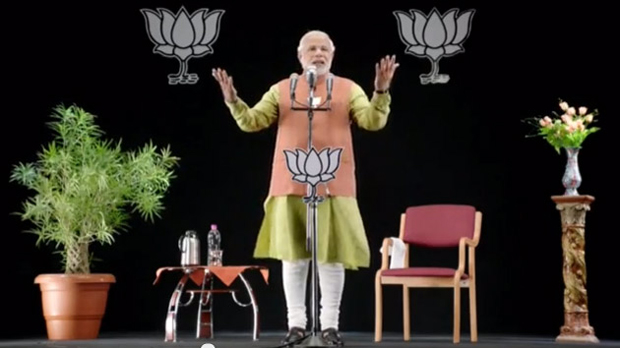
While campaigning to become prime minister, Narendra Modi addressed voters through 3D technology on several occasions (Photo: Narendramodiofficial/Flickr/Creative Commons)
Indians don’t usually take much notice of the prime minister’ speech on independence day in the middle of August. This year was different. This year there was so much discussion on social media that it became a trending topic.
In contrast to the way other prime ministers have handled this moment, new Prime Minister Narendra Modi of the Bharatiya Janata Party (BJP), wowed a large section of Indian society not just with what he said, but the way he said it. People are gushing over the fact that he spoke without notes, and did not use the usual bulletproof glass. Others are impressed with the content; he touched upon topics as diverse as rape, sanitation, manufacturing, and nation building, using easily accessible language. Modi is also using social media to get his views across direct to the public, and bypassing the mainstream media.
This straight-talking style only adds to Modi’s brand, but he is also attracting criticism from the mainstream media for not being willing to answer hard questions. His chosen methods of communicating with the public have one common thread: he prefers to address the public directly, plainly, without going through the mainstream media or any reliance on further explanation by them. His social media accounts on Facebook and Twitter have completely changed the way information comes out of the prime minister’s office (PMO). Modi’s tweets, both from his personal and his prime ministerial account, keep citizens updated on his various trips (“PM will travel to Jharkhand tomorrow. Here are the details of his visit”). He also updates on his musings (“I am deeply saddened to know about Yogacharya BKS Iyengar’s demise & offer my condolences to his followers all over the world”) and highlights from speeches made across the country (“when the road network increases the avenues of development increase too”), as well as photographs and videos. Citizens are getting a front row seat at his speeches and thoughts. But not everybody is happy about this — especially not the private mainstream media.
Unlike the previous government, Modi is yet to appoint a press advisor. That person, normally chosen from senior journalists in New Delhi, advises the prime minister on media policy. There isn’t a point person from the PMO for the mainstream media — or the MSM, as it is called — to discuss stories and scoops. He only takes journalists from the public broadcasting arms — radio and TV — on his foreign trips, in contrast to his predecessor, who brought along more than 30 journalists from the public and private channels. In fact, Modi has reportedly instructed his MPs to refrain from speaking to journalists. Indian mainstream media is filled with complaints that Modi is denying journalists the opportunity to engage with complex subjects like governance beyond official statements and limited briefings. Meanwhile, some other publications have scoffed that the mainstream media is only complaining because it will be forced to analyse the news and work towards coherent reporting instead of relying of well honed cosy relationships with people in power.
This apparent rift between the PMO and the private mainstream media has to be viewed through a variety of prisms for it to make any sense. The first is the very volatile relationship between Modi and the MSM which harks back to his time as chief minister of Gujarat, when a brutal communal riot took place. The second is the state of the mainstream media itself, continuously called out for unethical practices by the likes of the Telecom Regulatory Authority of India.
The relationship between Modi and the mainstream media is complex. No court has indicted Modi for any criminal culpability in the Gujarat riots of 2002, but many in the media have held him morally responsibly for the mass killings that carried on over three days, and let their feelings colour reports on him. But right before Modi’s historic sweep of the Indian general elections, this section of the press seemed to have begrudgingly warmed to the man they had long vilified.
One of India’s most respected journals, Economic and Political Weekly, published the article Mainstreaming Modi, deconstructing this new wave of coverage. It argued that the reasons for this change “range from how even the United Kingdom and the European Union have ‘normalised’ relations with him [Modi], that he has been elected thrice in a row to the chief ministership of Gujarat, which surely speaks of his abilities as an ‘efficient’ and ‘able’ administrator, that Gujarat has become corporate India’s favourite investment destination, and most importantly, that he is the guy who can take ‘decisions’ and not keep the nation waiting for action.”
During this year’s election campaign, Modi’s use of the media was innovative. Stump speeches were tailor made for the towns he was campaigning in. Modi’s 3D holograms, deployed in small towns while gave a speech elsewhere, were a spectacle not seen before in India. Though Modi had been speaking to Hindi and other Indian language media, he delayed giving interviews to the English language “elite” media, watched by a small but influential section of the population. He finally consented to doing a one-on-one interview with Arnab Goswami of Times Now, known as one of India’s loudest and most aggressive anchors. People readied themselves for the ultimate combative hour on television, but Modi’s no-nonsense answers, it seemed, won over both the anchor and the audience — especially as they were in sharp contrast to the vague statements put across by Modi’s challenger, Indian National Congress Party candidate Rahul Gandhi.
After the election win, India’s mainstream media has been forced to reassess what it wants from the prime minister. Is it information or is it access? The mainstream media undoubtedly has had a very complicated and close history with the political class. A Congress-led government has been ruling New Delhi for a decade, building up close relationships with senior editors and journalists. Some of these relationships were exposed through leaked conversations between members of the press and corporate lobbyists in a scandal now known as the Radia Tapes. They revealed, among other things, how journalists used their connections to politicians to pass on messages from lobbyists.
In fact, the indictment of improper behaviour by the media is a fairly regular occurrence in India. Just this month, the Telecom Regulatory Authority of India released their latest report, which recommends that corporate and political influence over the media can be limited by restricting their direct ownership in the sector. For this reason, the credibility and true affiliation of the media is always under the scanner.
But Modi and his team also need to respond to questions about why they will not deal with some parts of the media. How do they view the role of a combative media? Is only the public broadcaster, which reports the story as the government wants, to be allowed access? Are critical questions being avoided?
Perhaps, the last word can go to Scroll.in, one of India’s newest online magazines: “[T]he rat race for the ego scoop undermines the most important scoop, the thought scoop. We often don’t look at the big picture, don’t take the long view, don’t see the obvious, forget the past, don’t study the boring reports, substitute access journalism for ground reporting, believe the official word. Narendra Modi might just be doing us a favour by keeping us away.”
This article was posted on August 27, 2014 at indexoncensorship.org



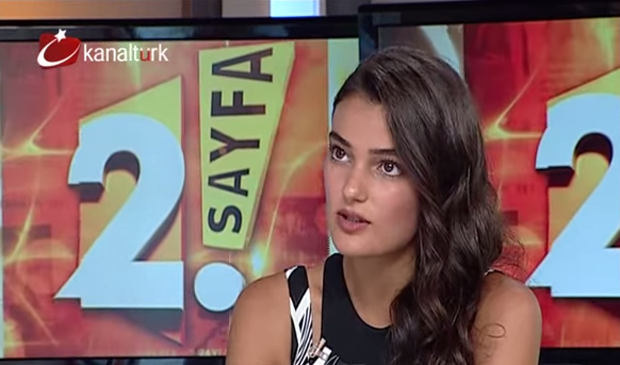

![(Photo: « Source : Réseau Voltaire » [CC BY-SA 3.0 (http://creativecommons.org/licenses/by-sa/3.0)], via Wikimedia Commons](https://www.indexoncensorship.org/wp-content/uploads/2015/01/Dieudonné_Axis_for_Peace_2005-11-18.jpg)




